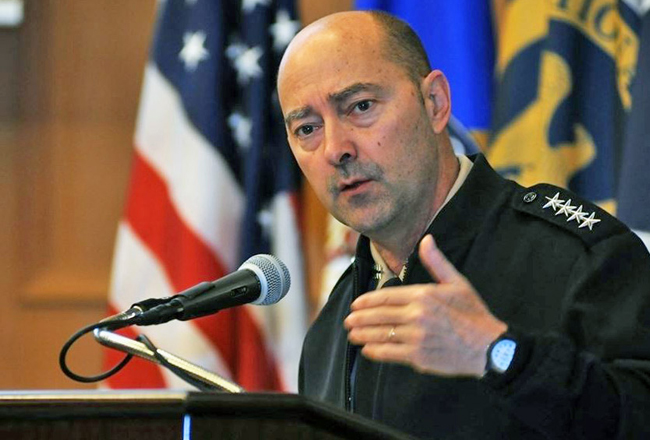Education, innovation, communication and collaboration are the key tools for leaders in the 21st century, according to retired Admiral James Stavridis, the first Navy officer to have held the position of NATO Supreme Allied Commander Europe.
But reading a good novel can come in handy as well.

That was the perhaps surprising twist to Stavridis”™ April 1 Charles F. Dolan lecture at Fairfield University, titled “21st Century Leadership: Challenges and Opportunities.” Stavridis ”“ who also was considered as a running mate by the Hillary Clinton campaign in 2016 and as a possible secretary of state by then-President-elect Donald Trump that same year ”“ is now an operating executive with The Carlyle Group.
“The simplest, quickest and easiest way” to build upon one”™s college education “is to read books ”“ nonfiction, of course, but fiction as well,” Stavridis told the Business Journal before his presentation. “A novel can drop you into a world and help you create an image of yourself in that world, which allows every book to be a simulator” of real-life situations, he said.
“Reading and leading are inextricably intertwined,” he said.
Stavridis was essentially born to a life in the military, growing up as the son of Paul George Stavridis, a U.S. Marine Corps colonel who served in World War II, the Korean War and the Vietnam War. In addition to his four years atop NATO, he also led the U.S. Southern Command, overseeing military operations throughout Latin America for nearly three years; served as senior military assistant to the secretary of the U.S. Navy and the secretary of defense; and collected more than 50 medals, 28 from foreign nations, during his 37-year naval career.
“I wanted the world,” he said about choosing the Navy, working his way up to becoming “a good mariner and captain, but while I knew how to launch a rocket, I couldn”™t launch an idea to save my life.”
That was corrected in 1984, when he earned a Ph.D. in International Relations from The Fletcher School of Law and Diplomacy at Tufts University while still in the Navy. He served as The Fletcher School”™s dean from 2013-18.
Developing his leadership philosophy throughout his adult life by both observation and experience, Stavridis said the nature of leadership has changed dramatically from the 19th century ”“ an age of imperialism exemplified by Otto von Bismarck, Germany”™s “Iron Chancellor” ”“ and the 20th, when Franklin Roosevelt took a more humane, open approach to leading. During his speech, he offered figures both expected (Angela Merkel, Indian Prime Minister Narendra Modi) and less obvious (Oprah Winfrey, Lady Gaga) as 21st century leaders.
“Lady Gaga has 78 million followers on Twitter,” he told the audience. “Is she a leader? Yeah, I think so.”
Speed and transparency are musts for leaders today, be they running a country, a corporation or a children”™s baseball team, he said ”“ noting that, with some 1.74 billion users, Facebook can be viewed as “the largest nation in the world.”
While innovation and communication can too easily be misinterpreted, respectively, as being all about technological advances and leading in an autocratic fashion, the admiral said that was not entirely the case. Messaging at scale must be accompanied at a retail, one-on-one level, he said: “Contact means everything.”
He also sounded the alarm about cybersecurity, where he said the disparity between the nation”™s preparedness and the threats it faces is still too great. “Data is kind of the new oil,” he said. “It drives the world.” He also wondered if the day”™s numerous flight delays ”“ one of which affected his own trip from Florida ”“ might have been a cyberattack, rather than the reported “technical glitches.”
Stavridis said that one of the biggest challenges facing the U.S. at the moment is the tenor of its dialogue: aided by the internet, opposing viewpoints are rarely tolerated, he said, with vilification from and toward both sides becoming the default position.
“We are awash in discussions of leadership,” he said, “but we are underserved in discussions of character.”
The admiral said he takes heart from the millennial and post-millennial generation, which he said is already showing encouraging signs of “breaking us out of our divisiveness.”
He concluded his remarks by quoting Napoleon: “A leader is a dealer in hope.”






















